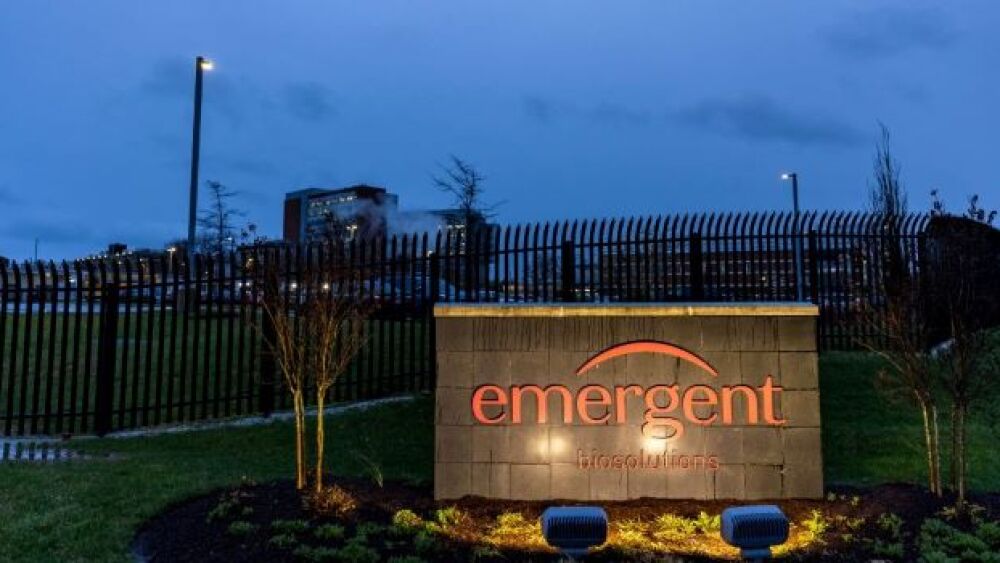The U.S. government canceled a contract with Maryland-based Emergent BioSolutions, which earlier in the year ruined about 15 million doses of the Johnson & Johnson COVID-19 vaccine.
Tasos Katopodis/Getty Images
The U.S. government canceled a contract with Maryland-based Emergent BioSolutions, which ruined about 15 million doses of the Johnson & Johnson vaccine earlier in the year. The contract was worth $628 million, and Emergent will lose about $180 million of it due to the termination of the contract.
In March and April 2021, Emergent, a contract research and manufacturing organization (CRMO), botched production for an ingredient of the J&J vaccine. J&J had a contract with the company for its production plant in Baltimore. The problem involved one batch of an ingredient in the vaccine, which ruined approximately 15 million doses. Investigations found that there had been a mix-up by Emergent between vaccine materials it was producing for both J&J and AstraZeneca. Both vaccines used the same technology, utilizing a harmless version of a virus vector to make a protein that stimulates the immune system to produce antibodies. But the two companies’ vectors are biologically different and not interchangeable.
In June, the U.S. Food and Drug Administration (FDA) decided to throw out at least another 60 million doses of the J&J vaccine manufactured at the site.
This led to Emergent executives testifying before a congressional probe. The U.S. Department of Health and Human Services (HHS) halted production at the facility of AstraZeneca’s vaccine in April and requested J&J place a new team to oversee manufacturing at the site. AstraZeneca worked with the Biden administration to find an alternate facility.
In addition to determining how the mix-up occurred, the probe was looking at the Trump administration’s awarding Emergent hundreds of millions of dollars in contracts over what appeared to be conflicts and cronyism. The company’s chief executive officer Robert Kramer sold $10 million in Emergent stock in January and early February, before company shares dropped later that month. Emergent said the trades were pre-established via an earlier trading plan, common for executives. The investigation also questioned Robert Kadlec, M.D., a consultant to Emergent, until 2015. Kadlec led the Office of the Assistant Secretary for Preparedness and Response (ASPR) under former President Trump. While in that position, Emergent inked millions of dollars in ASPR contracts as well as the $628 million contracts to manufacture COVID-19 vaccines.
In April, the FDA issued a 13-page report, slamming the Baltimore facility, citing that it was too small, poorly designed, and dirty. There were also other inadequacies, including unsealed medical waste, peeling paint, and damaged infrastructure. In addition, the staff was not trained appropriately and did not correctly handle ingredients.
According to Kramer, the cancellation of the contract was mutually agreed upon by the company and the U.S. government. In a letter Kramer published in The Baltimore Sun on Thursday, November 4, he defended the company, saying, “We’re proud of what our hundreds of employees have been able to accomplish right here in Baltimore. As the country looks ahead to preparing for the next pandemic, I want to share with you our experience and what we learned, so the country is better prepared for the future.”
Kramer noted that the company had started the relationship with HHS in 2012 after the 2009 H1N1 “swine flu” pandemic, and the company was founded to “help respond to and prepare for public health threats.”
Although ending the manufacturing partnership with the government, the facility in Bayview will continue manufacturing COVID-19 vaccines and treatments for private sector partners. It will also continue to supply the U.S. government with other necessary medical countermeasures.
He also points some of the blame at the government, that the original intent of the partnership was to “create a facility that could produce 50 million dose-equivalents of influenza vaccine drug substance in four months in the event of a pandemic.” Their first step was to expand the facility, then build, and maintain a state of readiness, which required continued investment. “The government maintained that they would provide us with the necessary drug development work to build and maintain those capabilities. That didn’t happen.”
He points out that Emergent had invested more than $200 million in the site, and it was still developing clinical-stage drug substances with fewer than 100 employees. However, the government never tested it for the flu, “much less a new virus. Ultimately, Emergent would hire and train more than 300 new employees and deploy never-before-tested processes and technologies to manufacture not one, but two, novel coronavirus vaccine candidates.”
He takes full responsibility for the cross-contamination between the J&J and AstraZeneca vaccine components and claims they have addressed the situation that led to it. He added, “Despite the setback, there are approximately 100 million people in the world who are safer because of vaccines made at Bayview, with more batches still under review. We are proud of this accomplishment. As of today, except for Emergent, none of the companies selected by the Biomedical Advanced Research and Development Authority to create CIADMs [Centers for Innovation in Advanced Development and Manufacturing] have yet produced the usable vaccine.”





